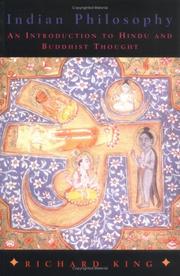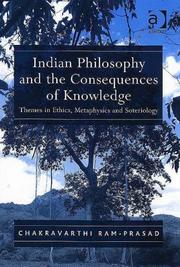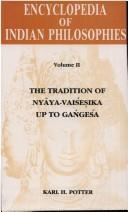| Listing 1 - 10 of 19 | << page >> |
Sort by
|
Book
ISBN: 0585078351 9780585078359 0791406628 9780791406625 0791498824 Year: 1991 Publisher: Albany, NY State University of New York Press
Abstract | Keywords | Export | Availability | Bookmark
 Loading...
Loading...Choose an application
- Reference Manager
- EndNote
- RefWorks (Direct export to RefWorks)
Phenomenology. --- Philosophy, Indic. --- Philosophy & Religion --- Philosophy --- Indic philosophy --- Philosophy, East Indian --- Hindu philosophy --- Philosophy, Modern

ISBN: 1474469892 0585159149 9780585159140 9781474469890 0748609547 9780748609543 0748611606 9780748611607 Year: 1999 Publisher: Edinburgh Edinburgh University Press
Abstract | Keywords | Export | Availability | Bookmark
 Loading...
Loading...Choose an application
- Reference Manager
- EndNote
- RefWorks (Direct export to RefWorks)
What is Indian Philosophy? Why has India been excluded from the history of philosophy? Richard King provides an introduction to the main schools of Hindu and Buddhist thought, emphasising the living history of interaction and debate between the various traditions. The book outlines the broad spectrum of Indian philosophical schools and questions prevailing assumptions about the 'mythical' ahistorical and 'theological' nature of Indian thought. Central philosophical questions are addressed: what really exists? How do we know what we know? Can we trust our perceptions of reality? What are we and where do we come from? Early chapters discuss the nature of philosophy in general, examning the shifting usage of the term throughout history. The author argues that a single definition or characterisation of the subject matter is impossible and that histories of philosophy remain tied to an ethnocentric and colonial perspective so long as they ignore the possibility of philosophical thought 'East of the Suez'. This highlights the need for a post-colonial and global approach to philosophy.Key FeaturesThematic approach rather than separate chapters on various schoolsEmphasis on history of interaction/debate between the various trendsIntroductory and concluding chapters on exclusion of 'India' from history of philosophy
Philosophy, Indic. --- Indic philosophy --- Philosophy, East Indian --- Hindu philosophy --- Philosophy, Indic
Periodical
ISSN: 23639962 09707794 Year: 1983 Publisher: New Delhi : ICPR,
Abstract | Keywords | Export | Availability | Bookmark
 Loading...
Loading...Choose an application
- Reference Manager
- EndNote
- RefWorks (Direct export to RefWorks)
Philosophy, Indic --- Philosophy, Indic. --- Filosofie. --- Indic philosophy --- Philosophy, East Indian --- Hindu philosophy
Periodical
Abstract | Keywords | Export | Availability | Bookmark
 Loading...
Loading...Choose an application
- Reference Manager
- EndNote
- RefWorks (Direct export to RefWorks)
The Journal of Indian Philosophy publishes articles on various aspects of classical and modern Indian thought. Coverage ranges from close analysis of individual philosophical texts to detailed annotated translations of texts. The journal also publishes more speculative discussions of philosophical issues based on a close reading of primary sources.
Philosophie de l'Inde --- Philosophy, Indic --- Philosophy, Indic. --- Indic philosophy --- Philosophy, East Indian --- Hindu philosophy --- Filozofia indyjska --- Filozofia indyjska.

ISBN: 9780754654568 0754686760 9780754686767 0754654567 1317117433 9781317117438 1317117425 9781317117421 1281099236 9781281099235 9786611099237 6611099239 9781315588308 9781317117414 1315588307 Year: 2007 Publisher: Aldershot, England Burlington, VT Ashgate Pub.
Abstract | Keywords | Export | Availability | Bookmark
 Loading...
Loading...Choose an application
- Reference Manager
- EndNote
- RefWorks (Direct export to RefWorks)
This book presents a collection of essays, setting out both the special concern of classical Indian thought and some of its potential contributions to global philosophy. It presents some key arguments made by different schools about this special concern: the way in which attainment of knowledge of reality transforms human nature in a fundamentally liberating way. It then goes on to look in detail at two areas in contemporary global philosophy - the ethics of difference, and the metaphysics of consciousness - where this classical Indian commitment to the spiritually transformative power of know
Philosophy, Indic. --- Knowledge, Theory of. --- Epistemology --- Theory of knowledge --- Philosophy --- Psychology --- Indic philosophy --- Philosophy, East Indian --- Hindu philosophy
Book
ISBN: 1498525911 0739188143 9780739188149 1306119928 9781306119924 9780739171721 0739171720 9781498525916 Year: 2013 Publisher: Lanham
Abstract | Keywords | Export | Availability | Bookmark
 Loading...
Loading...Choose an application
- Reference Manager
- EndNote
- RefWorks (Direct export to RefWorks)
Brahman and Dao: Comparative Studies of Indian and Chinese Philosophy and Religion is a pioneering volume highlighting possible bridges between Indian and Chinese cultures and complex systems of thought, and it includes 17 chapters on various Indo-Chinese comparative topics. It looks into four such themes: 1) metaphysics and soteriology, 2) ethics, 3) body, health and spirituality, and 4) language and culture.
Philosophy, Indic. --- Philosophy, Chinese. --- Philosophy, Comparative. --- Comparative philosophy --- Chinese philosophy --- Indic philosophy --- Philosophy, East Indian --- Hindu philosophy --- India --- China --- Religion.

ISBN: 0691071837 0691621454 1400870755 9781400870752 9780691621456 9780691071831 Year: 1977 Volume: 2 Publisher: Princeton, New Jersey
Abstract | Keywords | Export | Availability | Bookmark
 Loading...
Loading...Choose an application
- Reference Manager
- EndNote
- RefWorks (Direct export to RefWorks)
The complementary systems of Nyaya and Vaisesika constitute one of the oldest and most important traditions within Indian philosophy. This volume offers a systematic and detailed exposition of the two schools from their beginning to the time of Gangesa (A.D. 150-1350). An extensive interpretive essay introduces summaries of most of the known works written within the tradition. The result is both an excellent introduction for students and an indispensable guide to the thought and literature of early Nyaya-Vaisesika.Originally published in 1978.The Princeton Legacy Library uses the latest print-on-demand technology to again make available previously out-of-print books from the distinguished backlist of Princeton University Press. These editions preserve the original texts of these important books while presenting them in durable paperback and hardcover editions. The goal of the Princeton Legacy Library is to vastly increase access to the rich scholarly heritage found in the thousands of books published by Princeton University Press since its founding in 1905.
Philosophy, Indic --- Nyaya --- Vaiśeṣika --- Indic philosophy --- Philosophy, East Indian --- Hindu philosophy --- Hinduism --- Logic --- Philosophy, Indic - Encyclopedias --- Philosophy, Indic - Bibliography --- Vaisesika
Book
ISBN: 0585088039 9780585088037 1438405464 9781438405469 Year: 1991 Publisher: Albany, N.Y. State University of New York Press
Abstract | Keywords | Export | Availability | Bookmark
 Loading...
Loading...Choose an application
- Reference Manager
- EndNote
- RefWorks (Direct export to RefWorks)
Philosophy, Indic. --- Hindu philosophy. --- Philosophy, Hindu --- Philosophy --- Philosophy, Indic --- Indic philosophy --- Philosophy, East Indian --- Hindu philosophy --- Vedas --- Phrawēt --- Khamphī Phrawēt --- Fīdā --- Influence. --- Criticism, interpretation, etc.
Book
ISBN: 0585068658 9780585068657 0887067948 9780887067945 0887067956 9780887067952 143840543X Year: 1988 Publisher: Albany, N.Y. State University of New York Press
Abstract | Keywords | Export | Availability | Bookmark
 Loading...
Loading...Choose an application
- Reference Manager
- EndNote
- RefWorks (Direct export to RefWorks)
Philosophy, Indic. --- Philosophy, European. --- Philosophy, Indic --- Philosophy, European --- Philosophy --- Philosophy & Religion --- European philosophy --- Indic philosophy --- Philosophy, East Indian --- Hindu philosophy --- Europe --- Civilization --- Oriental influences.
Book
ISBN: 1501301500 1280123710 9786613527578 1441116079 9781441116079 9781441196576 1441196579 9781501301506 9781623565886 1441143831 9781441143839 9781280123719 Year: 2012 Publisher: New York : Continuum,
Abstract | Keywords | Export | Availability | Bookmark
 Loading...
Loading...Choose an application
- Reference Manager
- EndNote
- RefWorks (Direct export to RefWorks)
"In an increasingly multi-religious and multi-ethnic world, identity has become something actively chosen rather than merely acquired at birth. This book essentially analyzes the resources available to make such a choice. Looking into the world of intellectual India, this unique comparative survey focuses on the identity resources offered by India's traditions of reasoning and public debate. Arguing that identity is a formation of reason, it draws on Indian theory to claim that identities are constructed from exercises of reason as derivation from exemplary cases. The book demonstrates that contemporary debates on global governance and cosmopolitan identities can benefit from these Indian resources, which were developed within an intercultural pluralism context with an emphasis on consensual resolution of conflict. This groundbreaking work builds on themes developed by Amartya Sen to provide a creative pursuit of Indian reasoning that will appeal to anyone studying politics, philosophy, and Asian political thought."--Bloomsbury Publishing.
Philosophy, Indic. --- Self (Philosophy) --- Identity (Psychology) --- Personal identity --- Personality --- Self --- Ego (Psychology) --- Individuality --- Philosophy --- Indic philosophy --- Philosophy, East Indian --- Hindu philosophy
| Listing 1 - 10 of 19 | << page >> |
Sort by
|

 Search
Search Feedback
Feedback About UniCat
About UniCat  Help
Help News
News